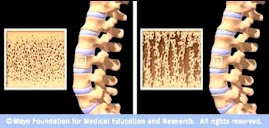Is it
safe to take strontium for osteoporosis when a patient has reduced
kidney function? This question came up recently in a health forum. The
patient had been taking strontium citrate for four years, but recently,
her eGFR (estimated glomerular filtration rate) had decreased to 49
ml/min, which is considered a moderate decrease in GFR. She was
wondering if she could continue taking strontium citrate.
Unfortunately, there are no data relating directly to strontium citrate
and reduced kidney function. However, because strontium citrate and
strontium ranelate are strontium salts and share some characteristics,
we can look at the summary of product characteristics (SPC) for Protelos
(strontium ranelate) to arrive at a reasonable answer for strontium
citrate. That SPC states that strontium ranelate is not recommended for
patients with severe renal impairment (creatinine clearance below 30
ml/min). No dose adjustment is required in patients with
mild-to-moderate renal impairment (30-70 ml/min creatinine clearance).
http://www.servier.com/sites/default/files/ProtelosSPCApril2014.pdf
The National Kidney Foundation states normal values for eGFR are 90-120
ml/min. An eGFR below 60 ml/min suggests that some kidney damage has
occurred. For information on the eGFR, see:
http://labtestsonline.org/understanding/analytes/gfr/tab/test/
Skeleton Pirate

Artist: LindaB
WELCOME TO STRONTIUM FOR BONES BLOG
Have you experienced negative, and even dangerous, side effects from Fosamax (alendronate), Boniva (ibandronate), Actonel (risedronate), Reclast (zoledronic acid), Prolia (denosumab), Forteo (teriparatide), Tymlos (abaloparatide), or other drugs prescribed for osteoporosis? If you have, then rest assured there is a safe, effective treatment for this condition. Strontium, primarily in the form of strontium citrate, is taken orally once a day.
Visitors to my blog can leave comments or ask questions and can remain anonymous, if they wish. Their comments are relayed to my g-mail inbox. Below each post, the number of comments for that post is cited and underlined because it is a link. By clicking on that link below any post, a window opens so that a visitor can leave a comment. Ideally, visitors leave comments on posts most relevant to their comments. All comments to my posts are moderated by me.
Browse the posts and visit the link library of references.
Visitors to my blog can leave comments or ask questions and can remain anonymous, if they wish. Their comments are relayed to my g-mail inbox. Below each post, the number of comments for that post is cited and underlined because it is a link. By clicking on that link below any post, a window opens so that a visitor can leave a comment. Ideally, visitors leave comments on posts most relevant to their comments. All comments to my posts are moderated by me.
Browse the posts and visit the link library of references.
Blog Archive
-
▼
2014
(58)
-
▼
September
(10)
- Strontium Products, Inert Ingredients, and Dosages
- Long-Term Effect of Strontium Ranelate Treatment o...
- Strontium Succinate
- Strontium Offers Natural Osteoporosis Treatment Br...
- Vitamin D and Mortality Risk: Should Clinical Prac...
- The Meeks Method
- Recommended Amounts of Strontium and Calcium
- Therapy for Patients with CKD and Low Bone Mineral...
- Chronic Kidney Disease and Osteoporosis
- Strontium and Renal Impairment
-
▼
September
(10)
Thursday, September 4, 2014
Subscribe to:
Post Comments (Atom)
Wandering Skeleton

Artist: Joel Hoekstra
Osteoporotic Bone

Source: www.mayoclinic.com
How Strontium Builds Bones
Strontium is a mineral that tends to accumulate in bone. Studies have shown that oral doses of strontium are a safe and effective way to prevent and reverse osteoporosis. Doses of 680 mg per day appear to be optimal. See my "For More Information About Strontium" links section.
Osteoporosis is caused by changes in bone production. In healthy young bones there is a constant cycle of new bone growth and bone removal. With age, more bone is removed and less new bone is produced. The bones become less dense and thus more fragile.
Scientists believe that strontium works in two ways. It may stimulate the replication of pre-osteoblasts, leading to an increase in osteoblasts (cells that build bone). Strontium also directly inhibits the activity of osteoclasts (cells that break down bone). The result is stronger bones.
When taking strontium, be sure to take 1200 mg calcium, 1000 IU vitamin D3, and 500 mg magnesium daily. It is best to take strontium late at night on an empty stomach. Calcium and strontium may compete with each other for absorption if taken together.
Osteoporosis is caused by changes in bone production. In healthy young bones there is a constant cycle of new bone growth and bone removal. With age, more bone is removed and less new bone is produced. The bones become less dense and thus more fragile.
Scientists believe that strontium works in two ways. It may stimulate the replication of pre-osteoblasts, leading to an increase in osteoblasts (cells that build bone). Strontium also directly inhibits the activity of osteoclasts (cells that break down bone). The result is stronger bones.
When taking strontium, be sure to take 1200 mg calcium, 1000 IU vitamin D3, and 500 mg magnesium daily. It is best to take strontium late at night on an empty stomach. Calcium and strontium may compete with each other for absorption if taken together.
For More Information about Strontium
- A Dose-response Study With Strontium Malonate
- A Review of the latest insights into the mechanism of action of strontium in bone
- Antifracture Efficacy Over 10 Years With Strontium Ranelate
- Combination of Micronutrients for Bone (COMB) Study: Bone Density after Micronutrient Intervention
- Effect of bone strontium on BMD measurements
- Effects of SrR on Calcium Metabolism
- Effects of strontium ions on growth and dissolution of hydroxyapatite and on bone mineral detection
- Influence of strontium on bone mineral density and bone mineral content measurements by dual X-ray absorptiometry
- Interpretation of BMD Scans in Patients Stopping Strontium
- Melatonin-micronutrients Osteopenia Treatment Study (MOTS)
- National Osteoporosis Foundation
- Osteoporosis And Bone Physiology
- P471 BENEFICIAL EFFECTS OF STRONTIUM RANELATE COMPARED TO ALENDRONATE ON TRABECULAR BONE SCORE IN POST MENOPAUSAL OSTEOPOROTIC WOMEN: A 2-YEAR STUDY
- Post-Marketing Assessment of the Safety of Strontium Ranelate
- PubMed Abstract On The SOTI Study
- PubMed Abstract On The TROPOS Study
- Strontium ranelate Aristo
- Strontium Ranelate For Spinal Osteoarthritis
- Strontium: Breakthrough Against Osteoporosis
- Summary Safety Review - Strontium
- Thirteen Key Diagnostic Tests
No comments:
Post a Comment